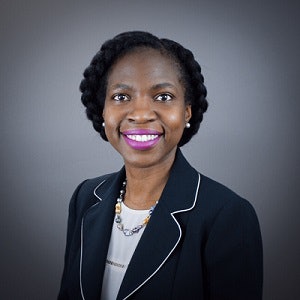When Dr. Maxine Roberts helped to start the Liberty LEADS college prep program at Bank Street College of Education, she noticed that too often students of color were admitted to top schools, but when they got there, they struggled.
She saw herself in her students.
“The students who I worked with were me,” Roberts said, “bright students who worked hard, studied, all of that, and then got to college and struggled in different ways … I’d grown up believing and hearing if you just work hard, if you just go to school, if you just get good grades, it’ll all work out.”
 Dr. Maxine Roberts
Dr. Maxine RobertsBut after over a decade with Liberty LEADS, she saw that “in many different scenarios that wasn’t the case” and was “left wondering, what is happening? Especially because for many of our students, the struggles were not academic, so something else was at play.”
That question led her down her current career path, where she focuses on how to remove barriers to success for students of color. Roberts went on to earn her Ph.D. from the Center for Urban Education at the University of Southern California’s Rossier School of Education, where she studied Black student success in developmental math at community colleges, using an assets-based approach.
Now she serves as the new director of Strong Start to Finish, an initiative of the Education Commission of the States, a nonpartisan nonprofit that supports state lawmakers in developing education policy. Roberts spent two years in other roles at Strong Start to Finish before taking the helm earlier this month.
Strong Start to Finish is a network dedicated to higher education equity, with a focus on what practices and policies help diverse students thrive in their initial year of college. In particular, the initiative is taking a hard look at remedial education.
Nationally, these classes don’t boost success for all students, at least as they currently stand. About 50% of students at public two-year colleges and 40% of students at public four-year institutions don’t finish their developmental coursework within six years, according to Strong Start to Finish’s website. Only 35% of students in developmental education at four-year colleges graduate within six years. Students in remedial courses at two-year colleges fare worse, with less than 10% of them graduating within three years.
University leaders are talking about how to reform their assessment and placement processes for these courses, but little attention is paid to students still struggling in developmental education, Roberts said.
It’s important to acknowledge successes, but “for me, the time is now actually to start talking about the students who are being left behind by these current reforms,” she added. “If all students aren’t being served, I think we need to take a step back and see where’s the support that can be given but then also where do we as higher ed start to take a look at ourselves to see what kind of barriers we could be putting up or allowing to exist?”
She pointed out that developmental education is an equity issue in part because Black and brown students and students from low-income backgrounds are frequently placed in these courses.
“I believe what happens in higher education can reflect the ways that society is looking at Black and brown students and Black and brown people, what they believe these individuals can achieve and what they don’t believe these individuals can achieve,” she said. “For example, who’s being advised to take developmental courses? Who’s not being advised to take these courses? … Higher education leaders also need to ask, how do these beliefs show up in the classroom and in teaching practices?”
Research shows that one solution might be getting rid of these courses altogether, she said, replacing them with “new course structures,” like guided pathways or a co-requisite model, where students receive extra academic supports rather than taking separate remedial courses. Though institutions might want to make changes rather than dismantle these courses altogether.
Regardless, she wants to see universities focus on both “structural” and “relational” practices to ensure students begin their college education in a way that fosters their ongoing success.
For Roberts, this is a “key moment” for this work.
“In addition to learning from the important developmental education reform work that’s happening across the country, I’m really excited to [take] a look at the students for whom current reform practices are not supporting their success, identifying what may be getting in the way of their success and then figuring out what are the – if we can be so bold and say – remedies for this,” she said. “What are the ways to start to address what’s happening for students for whom the current reform practices are not effective?”
Sara Weissman can be reached at sweissman@diverseeducation.com.


















